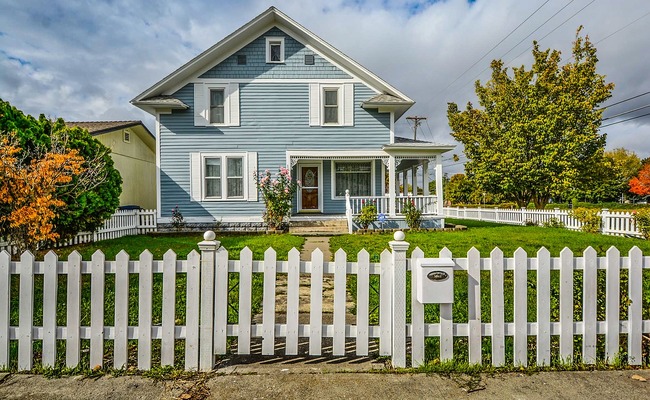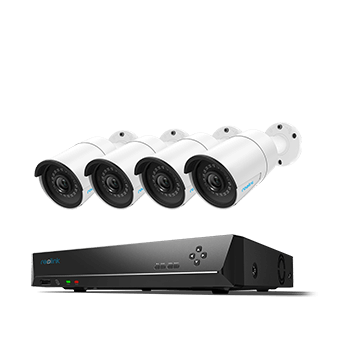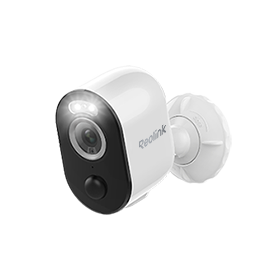The cost of home security system is not just the figure that you see on the price tag and it may include expenses of different components. So, how much does a home security system cost? Are you paying for the devices and features that you desire the most? And, are such security systems worth the price?
To help you choose cost-effective security systems for your home, we will walk you through the major fees that add up the total cost of a home security system and top factors to consider when selecting one.
How Much Does a Home Security System Cost?
The cost of home security system is not just about the equipment price, but also includes the expenses of installation, professional monitoring and other additional services.
Generally speaking, the average cost of a home security system is around $100 to $2000 with additional fees for installation ($49.99 -$199.99/each security device), professional monitoring ($14.99 - $34.99/month) and subscription plans ($10 - $20/month) combined.
Equipment Price
A home security system consists of security cameras, central managememt devices (NVRs/DVRs), motion sensors, automatic lights, motion alarms, control panels, smart locks and so on. The total prices of these equipment combined make up the basic cost of a home security system.
Installation Fees
The second major part that adds up the cost of a home security system is installation fees, ranging from $0 to over $3000. By setting up DIY security systems for your home, you won’t spend a dime on the installation.
On the contrary, if you hire an expert to do the installation job for non-DIY home security systems, they may charge you over $60 for each security device. Believe it or not, the average installation cost for a home security system is $1511.
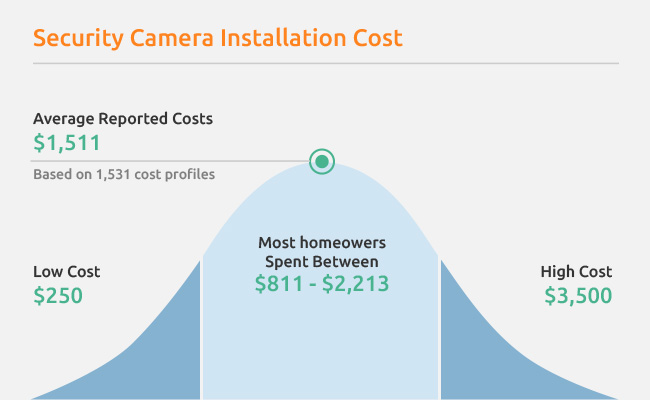
In some cases, the installers may also ask you to pay the activation fees to turn your equipment on. So, to reduce the cost of home security systems, it is best to consult the technicians if the activation fees are included in the installation cost or not when you schedule the installation appointment.
Monitoring Costs
The expenses on professional monitoring services are also counted as a significant part of the total cost of a monitored security system for home. Normally, monitoring service providers require you to sign a monitoring contract that lasts 1 to 3 years and charge you $15 to $30 per month as monitoring fees.
The good side of such professional monitoring is that once the motion sensors are triggered, these companies send you instant alerts and contact local police when you are away from home. However, if you want to terminate the contracts early, they may charge you an expensive cancellation fee. So, think twice before you sign a contract to obtain 24/7 monitoring services.
Subscription Fees
The cost of home security systems also includes the price of additional services like cloud storage, paid third-party software to control your home security system and smart home automation plans.
Also note that it depends on your security needs whether to subscribe to the additional service plans or not. If the basic offers meet your needs, then you don’t have to use the extra services and save the subscription cost of home security systems as well.
Additional Home Security Systems Cost
In addition to what we've covered in the previous section, additional costs could be associated with setting up a home security system.
Maintenance Cost
You will also spend some money on the daily maintenance of your home security system. However, the average cost is about $10 per year. For example, if you have battery-powered devices, you need to replace or recharge the battery regularly.
Cancellation Fees
You may need to sign a contract with the service provider if you choose the system from just one brand. The contract tells you how much you must pay monthly, the service duration, and what you owe if you cancel the service before the contract ends. In most cases, the cancellation fee is about 75% to 100%** of the remaining balance in your contract.
Local Permits
In many cities, you need a permit for the alarm of your home security system, and the cost varies from $40 to $550, depending on your location. These permits help the local police and fire departments contact homeowners quickly and prevent unnecessary alarms that can waste city resources.
Factors That Affect the Cost of Home Security System
The cost of home security systems can be influenced by several factors, and some of the main ones include:
Budget: Buy vs. Rent
If your budget barely covers the cost of home security systems, you may consider whether you should buy or rent a security system for your home. Renting one seems like a budget-friendly solution. But wait, don’t jump to a conclusion too early. Let’s start with a simple calculation:
The average cost of a home security system for rent is $20 to $50 per month, which is $240 to $600 each year.
Generally speaking, renting service providers require you to sign a 1-year or 3-year monitoring contract. So, the estimated cost of home security systems for rent goes up to $1800, which are equal to or even more expensive than that of a home security system for sale ($100 - $2000).
More importantly, you are entitled to enjoy the ownership of security systems after purchasing ones, meaning that you are free to take the security devices down and set them up in your new apartment.
In terms of renting, the service providers claim the ownership of the security systems when the contracts terminate. Even after paying so much for the cost of home security systems, you have to return the security equipment to the companies. Also note that the companies may also charge you early termination fees if you decide to discontinue the service within the contract period.
System Type: Wired vs. Wireless Home Security System
Installation is the second contributing factors to the typical cost of home security systems. If you are planning to install hard-wired security systems, you may have to drill holes and run the cables on your own or hire professionals to do the job with high installation fees.
To reduce the cost of home security systems, you may choose PoE security systems that require only one Ethernet cable to connect each PoE IP camera. So, you can set up these security systems in a breeze without paying installation fees.
Another flexible option is to use wire-free home security systems, which require no drilling and no hassles. By applying such wire-free security systems in your home, you don’t have to inform your landlords to get their permission in advance if you are renting an apartment. Also, you are free to uninstall the wire-free security equipment and reposition them in your new home.
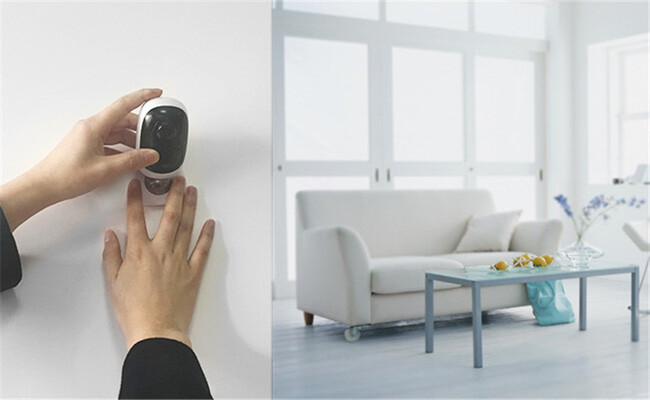
Monitoring Service: Self-Monitoring vs. Monitored Ones
The expenditure on 24/7 monitoring services and subscription plans also increase the typical cost of security systems for home. But that’s not a must. By using self-monitoring security systems, you also receive instant alerts and take in-time actions without paying month-to-month fees when there are suspicious events.
Also, you are free to add your family members and close friends as admins to the systems. So, even if you are far away from home, they will be alerted by motion-triggered events and react correspondingly as well.
Brand: Reputable vs. Low-Cost & No-Name Home Security System
Though a low-cost or no-name home security system is more friendly to your budget, the cost of such home security systems may not include installation fees, subscription fees or accessory price in its price tag.
Moreover, these home security systems do not come with qualified security equipment, responsive customer service or a long warranty period. So, you need to pay for the repairs when anything goes wrong. Mind that some top security system brands also offer affordable security solutions with warranties and customer support and you can also employ money-saving tips when buying home security systems.
Home Security Cost of Popular Brands
Currently, there are numerous renowned brands in the market. To provide you with detailed cost information for popular home security systems, we have compiled a chart below:
Resource: bob vila. The exact price might fluctuate over time, so feel free to check the official website of each brand for the most up-to-date pricing information.
How to Reduce the Cost of Home Security System: 5 Useful Tips
In some cases, even after paying the high cost of home security systems, you don’t receive products that you want the most. Before you make a purchase, take a look at the following tips to avoid overpaying:
1. Choose Home Security Systems from Top Brands
You may doubt that if it is worthwhile to pay for the cost of home security systems of well-known brands. As noted above, no-name security systems may cost you more for less qualified products and hidden fees.
In comparison, top security system brands provide you qualified security equipment, responsive customer service, money-back guarantees and warranties as well. By using high quality security systems for your home, you are free of the troubles to get your equipment fixed from time to time. In case there are any problems, just contact the support team of the home security brands and they will come back to you soon.
Moreover, such security systems bring you peace of mind and many other benefits: reducing home insurance, using recordings as solid evidence, capturing the happy time that you spend with your family members and so on.
2. Use DIY & Self-Monitoring Home Security Systems
As mentioned above, installation fees and monthly fees for professional monitoring take up a considerable part of the average cost of home security systems.
If you prefer one-and-done cost, a DIY and self-monitoring security system like Reolink RLK8-410B4 is an ideal option.
8-Channel PoE Security System
4 pcs 5MP/4MP Security Cameras; 2TB HDD 8-Channel NVR for 24/7 Reliable Recording; Plug & Play; 2 Network Solutions.
Such home security systems, featured with easy configuration, provide everything you need for the installation in the packages. So, even as beginners, you are able to set up the security systems without extra expenditures on accessories.
Here is a tuorial video providing useful tips for you to install security cameras by yourself.
Also, these security systems without monthly fees allow you to control and access the security equipment on your own via NVRs and totally free software. If you prefer wire-free battery security equipment, take a look at Reolink Argus 3 Pro.
2K 100% Wire-Free Spotlight Camera
2K 4MP Super HD, Battery/Solar Powered, Person/Vehicle Detection, 5/2.4 GHz Dual-Band WiFi, Color Night Vision, Two-Way Audio.
3. Select Home Security Systems That Work with Smart Home Compability
By setting up security systems with smart home automation feature, you are also able to reduce the total cost of a home security system. It is estimated that nearly 70% of the American families will own a smart speaker to control smart home devices via voice commands.
With home security systems that work with smart home devices, you don’t have to spend extra money in upgrading the existing security equipment at your home, which makes such smart security systems future-proof and cost-effective options.
4. Invest in Most-Wanted Home Security Devices or Features
To purchase cost-effective home security systems, make sure that you invest in the most-needed devices and features. Some systems come bundled with additional devices like thermostats, door locks and control utilities that add up the estimated cost of home security systems.
So, it is best to take a closer look at what security equipment is included in the system kit before paying upfront to avoid spending money on the fancy features that you don’t need at all.
5. Use Multiple Storage Options
The subscription fee for monthly cloud storage plans is not a compulsory expense. To reduce the cost of a home security system, make full use of other storage options like NVRs, SD cards and FTP servers to save the security camera recordings.
You may also make a copy of the recordings to your PCs from time to time so that you won’t lose any recordings in case of overwriting or damages to the storage options.
FAQs
How much does a home security system cost?
The common price of a home security system is around $100 to $2000, with additional installation fees, monitoring service, and subscription plans.
Are home security systems worth it?
It depends on your specific security needs and circumstances. For example, suppose you have concerns about the security of your home or property. In that case, security cameras can be a powerful deterrent to potential intruders and record any incidents.
Do all the home security systems have a monthly fee?
Not all home security systems require a monthly subscription fee, and the cost of this fee can vary from one brand to another. Some famous brands, like ADT, Vinvit, Cove, and Simlisafe, have a monthly fee ranging from $10 to $50.
Conclusion
A home security system's cost can vary from brand to brand and can be affected by several factors. To save the budget, you can purchase systems from famous brands and choose devices that are easy to install.
What is the reasonable cost of a home security system in your opinion? Do you think that home security systems are worth your investment? Share your ideas in the comment below and we would love to listen!

